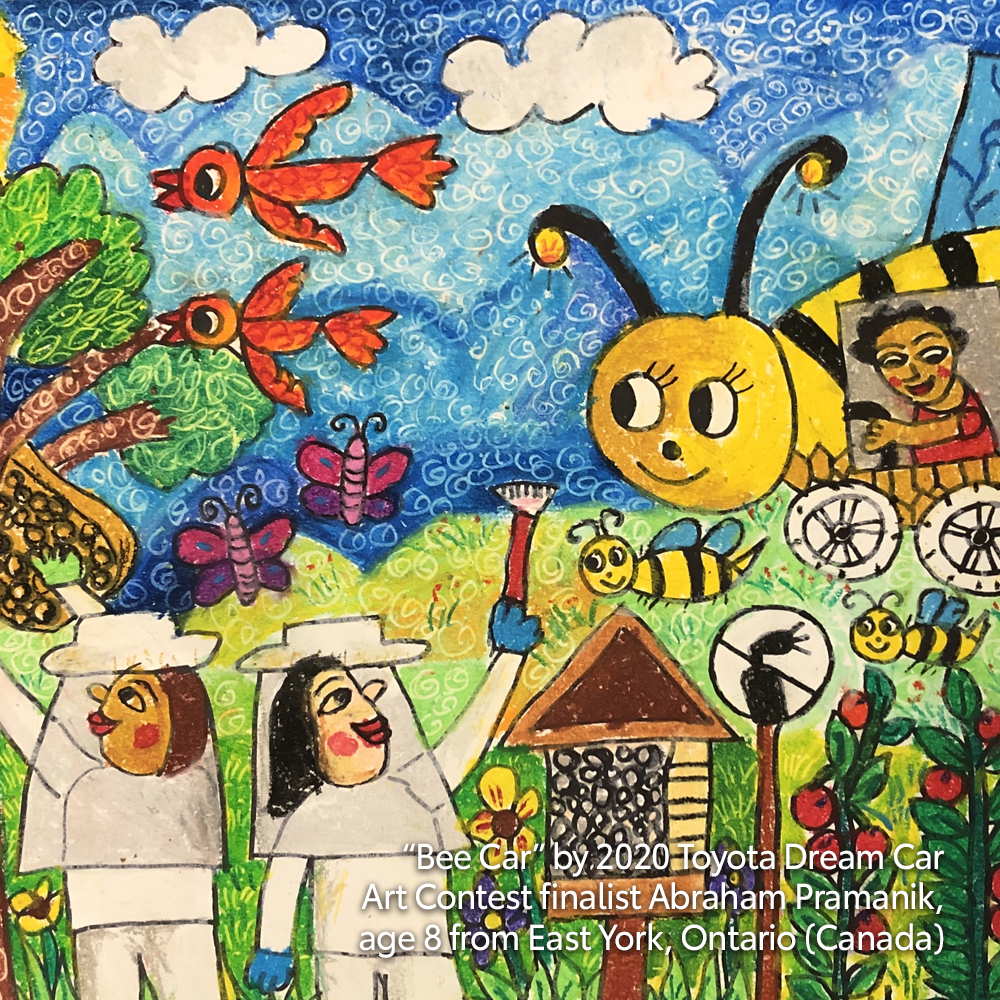NET POSITIVE IMPACT
Outreach with our stakeholders, including "Dealers", "Suppliers", and "Communities & Nonprofits", is a crucial component of our environmental sustainability strategy. Through outreach, we create mechanisms for building on the successes of our environmental programs and scaling up the outcomes. We can act locally and make a difference globally.
We acknowledge that a stronger commitment to partnership and collaboration is needed to address the world‘s environmental challenges successfully. Across our diverse set of partnerships, we are taking steps to build a path to achieving the Toyota Environmental Challenge 2050 and a net positive impact. Through the power of collaboration, we hope to create lasting positive outcomes on a macro scale that will help us build a more sustainable future.
COMMUNITIES & NONPROFITS
TMNA supports local and national community projects that align with our core focus areas of Carbon, Water, Materials and Biodiversity. By concentrating our support on organizations that address challenges in these four areas, we are building on our environmental commitment beyond minimizing negative impacts and helping to promote positive environmental change across the North American region. We share our know-how and collaborate so that we can build more than great cars – we are building a better tomorrow by harnessing the power of collective action.
TMNA team members participate on the Boards of Directors or Executive Committees of several nonprofit organizations, such as Yellowstone Forever, Kentucky Fish & Wildlife Foundation, "National Environmental Education Foundation," Wildlife Habitat Council and Environmental Media Association. TMNA is also a member of the National Council of World Wildlife Fund (WWF), an advisory group to WWF's Board of Directors in the U.S.
ECS YOUNG INVESTIGATOR FELLOWSHIP
The ECS Toyota Young Investigator Fellowship is a partnership between the Electrochemical Society (ECS) and Toyota Research Institute of North America (TRINA), a division of Toyota Motor North America R&D. Now in its sixth year, the fellowship encourages young professors and scholars to pursue research in green energy technology that promotes the development of next-generation vehicles capable of utilizing alternative fuels.
Electrochemical research has already informed the development and improvement of innovative batteries, electrocatalysts, photovoltaics and fuel cells. Through this fellowship, ECS and Toyota hope to see further innovative and unconventional technologies borne from electrochemical research.
Fellowship recipients receive a $50,000 grant to conduct the research outlined in their proposals and a one-year complimentary ECS membership. After one year of funding, recipients submit a midway progress report and a final written report. Recipients are invited semiannually to present their research progress at TRINA.
In addition, recipients publish their findings in a relevant ECS journal using the open access option and/or present at an ECS meeting within 24 months of the end of the research period. At the end of the fellowship period, depending on the progress of their research and the results obtained, Toyota may elect to enter into a research agreement with the recipient so their research can continue.
The ECS Toyota Young Investigator Fellowship Selection Committee chose three recipients to receive the 2020-2021 fellowship awards for projects in green energy technology:
- Prof. Dr. Shoji Hall, Johns Hopkins University
- Prof. Dr. Piran Ravichandran Kidambi, Vanderbilt University
- Dr. Haegyeom Kim, Lawrence Berkeley National Laboratory
LEXUS ECO CHALLENGE
The globe's young students are becoming increasingly aware of our planet's environmental challenges, and their collective commitment to helping alleviate humans' negative impact is nothing less than stunning. For the 13th year, the efforts of these students have been supported and rewarded through their participation in the Lexus Eco Challenge, a program, in partnership with Scholastic, that invites more than 2,000 U.S.-based students in grades 6–12 to tackle environmental issues in their communities, create and submit their action plans and results, and compete nationally for a total of $500,000 in grants and scholarships.
Lexus and Scholastic, the global children’s publishing, education and media company, reviewed the finalists’ innovative submissions and selected one middle and one high school team as the 2020 Lexus Eco Challenge Grand Prize winners. The Grand Prize–winning teams each receive $30,000, divided into a $7,000 grant for the school, a $3,000 grant for the team’s teacher advisor, and $20,000 in scholarships for the students to share.
Eight First Place–winning teams are awarded $15,000 in grants each.
For the first two phases of the Lexus Eco Challenge, 32 middle and high school teams were selected as finalists. Each finalist earned a $10,000 prize to be shared among the team, teacher and school, and was invited to embark on the final challenge to reach beyond their local community to inspire environmental action. The teams communicated their innovative ideas to a wide audience in the last round, broadening the reach of their work to people outside their communities.
This year's high school Grand Prize–winning team is The Turtle Trackers from Arlington High School in Lagrangeville, New York. The Grand Prize–winning middle school team is R.E.M. Remote Environmental Monitoring from P.S. 28 Christa McAuliffe School in Jersey City, New Jersey.
High School Grand Prize Winner The Turtle Trackers and teacher advisors Tricia Muraco and Maribel Pregnall decided to address the decline of the local Blanding’s turtle population, a federally endangered species. Over seven months, the Turtle Trackers reached out to turtle researchers and centers across the country to gain more knowledge, and conducted their own field research in the local wetlands to monitor the turtle’s nesting patterns and track hatchlings. They created educational videos and interactive lesson plans for local K–2 classrooms, presented to hundreds of local community members, partnered with the New York State Department of Environmental Conservation and their local representatives in Congress, and conducted an extensive public relations campaign, securing features in local media outlets and an extensive social media following.
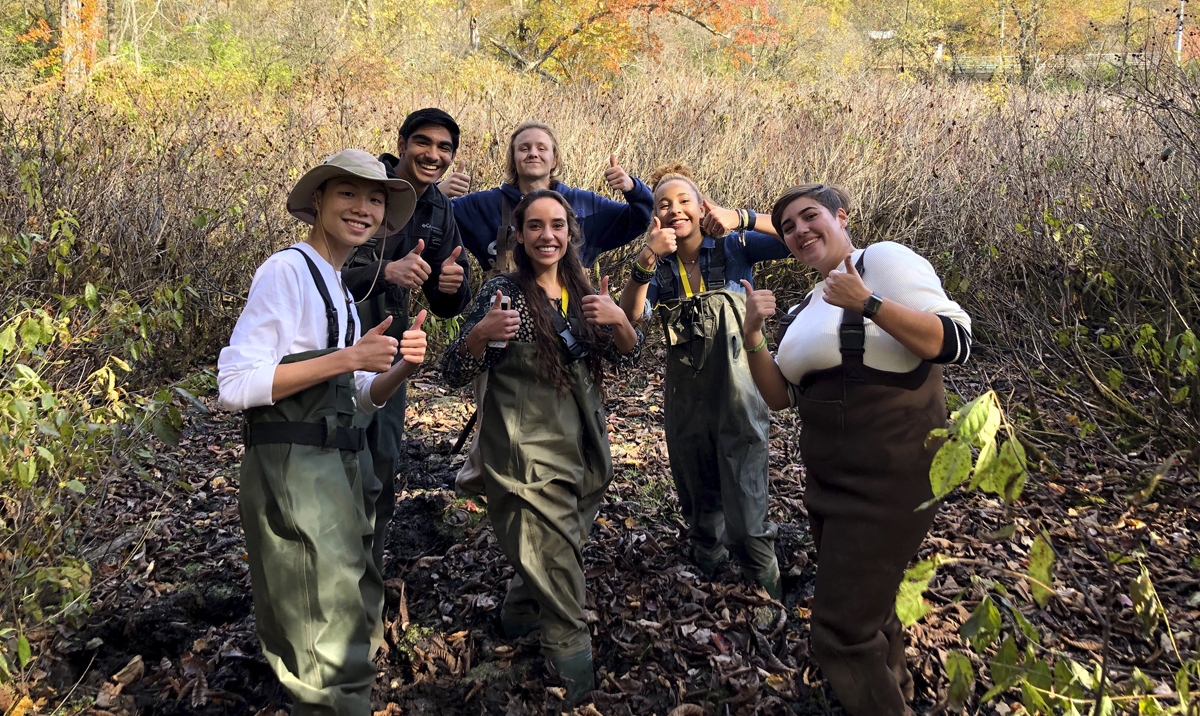
The 2020 Lexus Eco Challenge Grand Prize-winning high school team: The Turtle Trackers from Arlington High School in Lagrangeville, New York
Middle School Grand Prize Winner R.E.M. Remote Environmental Monitoring, aided by teacher advisors Joel Naatus and Mahvish Haq, helped their Jersey City community identify harmful environmental problems by developing and implementing remote environmental monitoring systems across their community. The students set up one system to detect temperature and humidity, another to check hydrogen sulfide and air quality levels, and a third to detect potentially harmful algal blooms in a local lake. All of the systems will help ensure the public will be able to check readings and know if the areas are safe to visit in the future. The students broadcasted by creating a website with podcasts and blog posts and using Twitter and Instagram, and taught a fourth-grade class about their work.
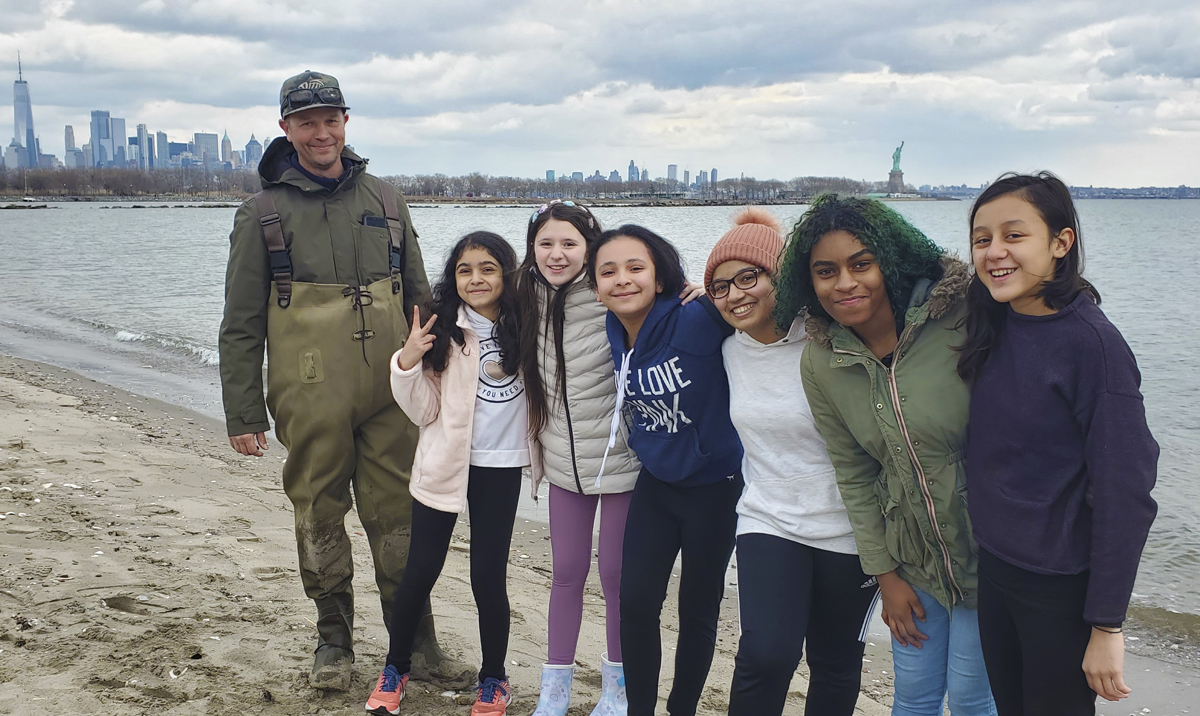
The 2020 Lexus Eco Challenge Grand Prize–winning middle school team: R.E.M. Remote Environmental Monitoring from P.S. 28 Christa McAuliffe School in Jersey City, New Jersey.
NATIONAL ENVIRONMENTAL EDUCATION FOUNDATION
Toyota has been partnering with the National Environmental Education Foundation (NEEF) for more than 25 years. NEEF partners with local organizations across the nation to connect people of all ages and abilities with public lands for recreation, hands-on learning and community building.
BIODIVERSITY CONSERVATION GRANT
With major support from Toyota Motor North America, NEEF launched the Biodiversity Conversation Grant program, which is designed to support biodiversity conservation projects on America’s public lands. The first round of grant projects focuses on large-scale eradication of invasive species and restoration with native plant and animal species.
In 2019, NEEF and Toyota selected the National Capital Partnership for Regional Invasive Species Management (NCR-PRISM) as the recipient of the first Biodiversity Conservation Grant. The partnership is composed of local and federal government agencies, conservation organizations and academic institutions working together to combat invasive plant species in the National Capital Region. Together, PRISM members are responsible for the management of roughly 1,500 square miles of forested lands in Washington, D.C., Maryland and Virginia.
PRISM will restore native biodiversity and protect critical habitats by managing invasive species across the National Capital Region. The partnership will accomplish this by coordinating and implementing on-the-ground invasive species management and habitat restoration efforts. Three agencies are leading this work on behalf of PRISM: D.C. Department of Energy and Environment (DOEE), Rock Creek Conservancy (RCC), and Fairfax County Park Authority (FCPA).
In November 2019, the DOEE collaborated with several other PRISM members to host a "Weed Warriors" training event for community members. This was a half-day event attended by 22 people that included two hours of lectures and two hours of field identification and invasive plant removal.
RCC has continued to build plans for the restoration of the Melvin Hazen mini-oasis in Rock Creek Park. Working closely with the park botanist, RCC identified a scope of work that has been shared with prospective invasive plant management contractors. Since November, nine invasive species removal events have been hosted, engaging a total of 168 volunteers.
RCC also hosted a convening of the staff from Montgomery Parks (MNCPPC) and the National Park Service at Rock Creek Park to discuss ways to coordinate work. This project is starting to build a professional and collegial relationship between two adjacent land managers to foster inter-agency discussion and implementation of invasive plant management. The plants spread across borders, so coordinated management will provide greater impact for both agencies.
During much of 2020, the COVID-19 pandemic has made it difficult to host community engagement events and perform projects on public lands. Pre-coronavirus, FCPA was preparing to launch a massive community engagement event “Take Back the Forest.” It was recruiting local community groups and environmental organizations to serve as event partners. Proposed activities have been postponed until later in 2020 or 2021. In the wake of COVID-19, RCC has also been encouraging socially distant stewardship through online training and virtual volunteer workshops designed to teach community members how to properly remove invasive plants.
For more on our grant to PRISM, watch this video.
NATIONAL PUBLIC LANDS DAY
For the 22nd consecutive year, Toyota was the national corporate sponsor of National Public Lands Day (NPLD), hosted by NEEF. Held every September, NPLD is the largest single-day volunteer effort for public lands in the U.S.
NEEF made several changes to NPLD in 2020 in light of the continuing COVID-19 pandemic. "Due to social distancing requirements remaining in place for the foreseeable future, many public lands sites were unable to host large, in-person NPLD events," said Meri-Margaret Deoudes, president and CEO of NEEF. "As always, our primary concern remains the health and safety of all those involved in NPLD events, including site managers and volunteers. With this in mind, we are excited that NEEF has embraced our 'new normal' by expanding the available options for volunteers during this year's NPLD on September 26, 2020."
NPLD 2020 included virtual events designed to connect the public to iconic parks, national forests, marine estuaries and other public lands sites. These online events served as an alternative for NPLD site managers who were uncomfortable with or were not allowed to host in-person events due to local regulations. This also provided an avenue for volunteer engagement to those who may not normally have been able to participate.
The virtual events were tied to specific public lands sites at the federal, state and local levels, and were hosted by a qualified guide—such as park or forest rangers or local conservation group member—who helped lead participants through the event and answered any questions. NEEF collaborated with its federal and established NPLD partners to cultivate virtual events, including live discussions with rangers and conservationists, educational projects for children of all ages, and virtual tours of national parks, marine sanctuaries and other awe-inspiring outdoor spaces.
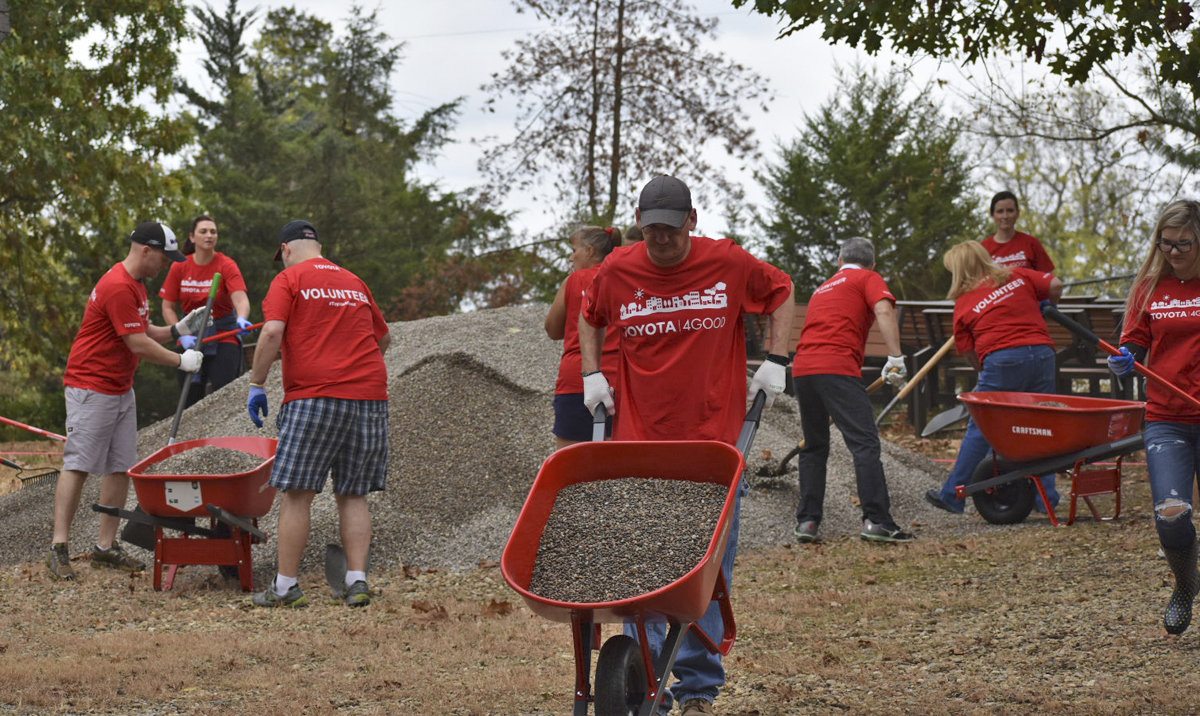
Toyota team members from the assembly plant and the production and engineering center in Georgetown, Kentucky, participated in NPLD at Salato Wildlife Center in Frankfort in September 2019. They were among the 156,000 volunteers – up 38 percent from 2018 – that participated in NPLD at 2,117 sites across the U.S. They joined in trail building, coastal and park cleanups, interpretive classes and guided hikes.
RESTORATION & RESILIENCE FUND
The COVID-19 pandemic has fundamentally changed the way Americans go about their lives. With social distancing regulations in place and recreation centers closed, people are turning to the outdoors more than ever for exercise and rejuvenation.
NEEF's Restoration & Resilience Fund is aimed at supporting the agencies and organizations—both locally and nationally—that maintain America’s public lands. Due to the COVID-19 pandemic, these outdoor spaces have seen a surge in usage—two to three times as many visitors in some areas—as well as a sharp reduction in staff and volunteer projects that keep them open and available for all Americans to enjoy.
With help from Toyota Motor North America and International Paper, NEEF established the Restoration & Resilience Fund to aid the public lands that need it most. NEEF plans to work with its federal, state and nonprofit partners to identify critical volunteer projects at public lands sites across the U.S. and provide them with additional funding once it is safe for those projects to resume.
RESTORATION & RESILIENCE GRANTS
Extreme weather events have been grabbing headlines with increasing frequency. Whether a hurricane, tornado or flood, communities face the challenge of recovering from the damage and preparing for potential repeats. Nonprofit organizations are taking a larger role in helping communities rebound, and restoring their access and enjoyment of local public lands is an important component. To support these efforts, NEEF, with sole funding support from Toyota Motor North America, awarded $275,000 in grants to organizations in the U.S. and Puerto Rico.
The first round of grants, worth $200,000, was awarded to 10 organizations that worked on projects designed to help restore public lands and/or implemented new ways to make those lands more resilient to future disasters. Grantees were required to mobilize community volunteers and educate community members about the importance of their actions and their relationship to long-term sustainability of the lands. In October 2019, at the completion of the first one-year grant period, the grantees reported the following progress:
- 377 acres of land restored
- 733,408 square feet of invasive species removed
- 2,770 native species planted
- 10,682 pounds of trash removed
- 1,987 volunteers engaged
- 7,948 volunteer hours
- $202,117.64 in value of volunteer hours
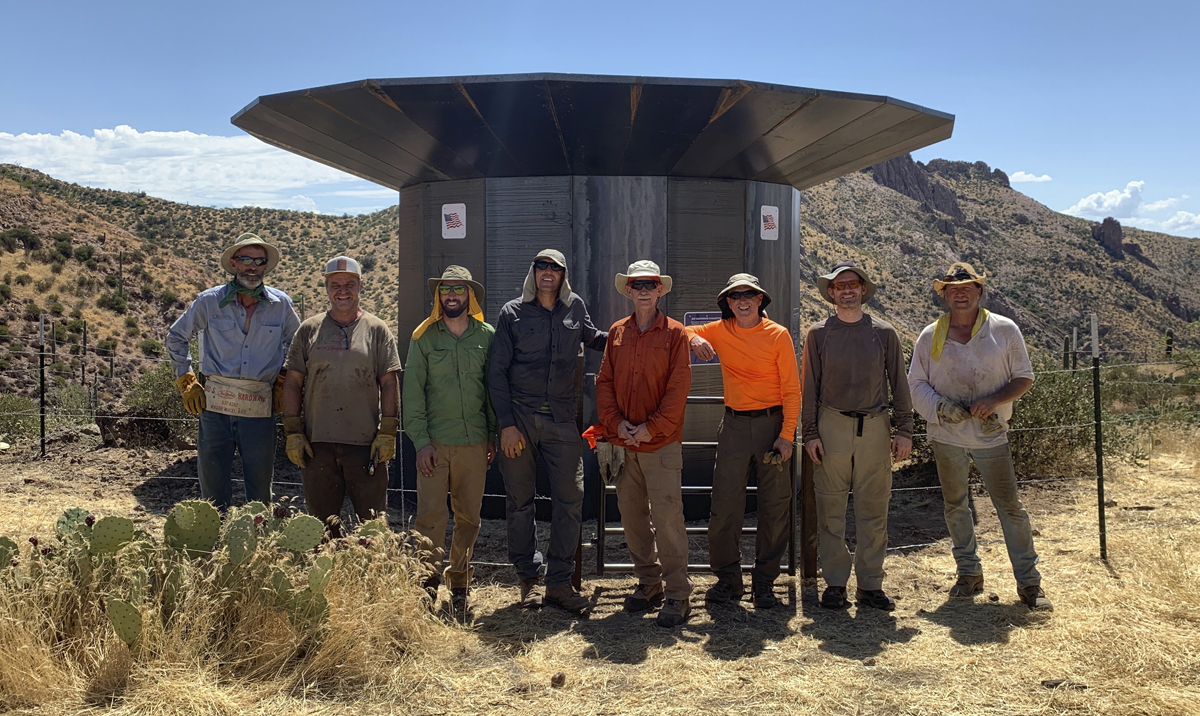
Thanks to a Restoration & Resilience Grant, the Arizona Trail Association installed a remote rainwater collector to provide much-needed drinking water along a segment of the Arizona National Scenic Trail. This project is the first of its kind for recreational trails in America and could be a game-changer for long-distance trails like the Continental Divide Trail, Pacific Crest Trail, and others that feature long, dry segments of trail without natural water sources.
In 2020, three grantees were awarded a second round of funding totaling $75,000:
Land Trust of North Alabama: Monte Sano Nature Preserve, Huntsville, Alabama
Established in 1987, the Land Trust of North Alabama works to preserve the region’s scenic, historic and ecological resources through conservation, advocacy, recreation and education. The Land Trust currently manages more than 7,000 acres in five counties, including over 70 miles of public trails maintained with the help of committed volunteers.
The purpose of the initial Trail Reconstruction Project was to return a vital Land Trust trail—damaged by drought and erosion—to a usable and sustainable condition, and then use this renovation as an example and educational tool for sustainable trail building and improvements to be used on Land Trust and other preservation properties. For the second round of Restoration & Resilience Grant funding, the Bluff Line Trail Reconstruction Project – High Trail Connection project will serve a similar purpose, but on a trail that connects the Land Trust’s Monte Sano Nature Preserve to the Monte Sano State Park via City of Huntsville Lands.
Mountain Studies Institute: San Juan National Forest, Durango, Colorado
The Mountain Studies Institute (MSI) was established in 2002 in Silverton, Colorado, as an independent, not-for-profit center of knowledge dedicated to collaboration between researchers, educators, policy makers and the wider community surrounding the San Juan Mountains. In the wake of the area’s devastating 416 Fire in June 2018, MSI stepped in to develop the 416 Fire Recovery and Response Plan for the town of Durango, which was severely impacted by the wildfire and subsequent debris flows into the nearby Animas River.
With the second round of grant funding, MSI plans to implement this community response plan as well as further develop outreach events and educational activities for adults and youth, such as the San Juan Resilience Youth Summit and Hermosa Resilience community event. They will also build on successful stewardship events like National Trails Day and National Public Lands Day, and increase fire-adapted community resilience to help prevent future disasters.
Timucuan Parks Foundation: Timucuan Trail State and National Parks, Jacksonville, Florida
Timucuan Parks Foundation (TPF) supports the Timucuan Trail State and National Parks, a unique partnership between the National Park Service, Florida State Parks and city preservation parks in Jacksonville—the nation’s largest urban park system. Established in 1999, TPF’s mission is to preserve, promote and enhance Jacksonville’s natural areas through community engagement, education and enjoyment.
In year two of their "Restoration and Resilience: Service Learning Lessons from the Timucuan Preserve" project, TPF will continue to collaborate with their national, state, city and community partners to address hurricane impacts and the value of healthy salt marshes and coastal ecosystems to mitigating those impacts. They will continue to provide hands-on learning opportunities and educational programming for all citizens, including engaging Jacksonville’s military veterans and their families. TPF will also build on the successful water quality and salt marsh monitoring projects with local middle and high school students that was established in the first year of grant funding.
Due to the ongoing COVID-19 pandemic, some of the planned activities have been delayed or adjusted to follow social distancing requirements and other safety measures. The grantees are finding creative ways to engage volunteers virtually and remain committed to restoring these public lands and making them more resilient to future disasters.
NATIONAL MAYOR'S CHALLENGE FOR WATER CONSERVATION
In August 2020, residents from cities across the United States took part in the ninth annual Wyland National Mayor's Challenge for Water Conservation as part of National Water Quality Month. The program encourages residents across America to make small changes in their lives to better manage our water resources and improve the health of our ocean, lakes, rivers, streams and wetlands.
In the wake of the current pandemic, the campaign is providing residents with more opportunities to get involved safely from home, including making water-friendly lifestyle changes on behalf of their city, undertaking home-based environmental projects that add up to cleaner, safer communities, and sharing tips and strategies with friends and neighbors. Last year, mayors from 39 states encouraged residents to make more than 740,000 pledges to promote drought resiliency, protect watersheds, and reduce stress on aging water infrastructure.
"It's more important than ever to maintain smart habits that support the health of the world around us -- especially when it comes to our water and air," said marine life artist and conservationist Wyland. "If Covid has taught us anything, it's that we can change behaviors for the benefit of everybody."
Despite school closures, teachers working remotely were also encouraged to engage their students to take part by accessing a special section of the website to make a series of water-saving commitments with their classes and win classroom supplies and gift cards for their school.
The nonprofit campaign, which has included numerous live events, educational tours and hundreds of city-led activities over the past decade, is presented in association with The Toro Company, EPA WaterSense, National League of Cities, Conserva Irrigation, and Earth Friendly Products (makers of ECOS). The Challenge encourages residents to follow their city’s progress throughout the month and to use that information to encourage friends, neighbors, businesses and civic groups to get involved.
Due to the postponement of this event from April to August, we were not able to include final results in this report. Check the program's website at https://wylandfoundation.org/programs/mayors/ for updates on pledge statistics.
